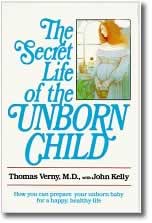The Secret Life of the Unborn Child - Thomas Verny

By creating a warm, emotionally enriching environment in utero,
a woman can make a decisive difference in everything her child
feels, hopes, dreams, thinks, and accomplishes throughout life.
Verny is a pioneer in the field of pre- and perinatal
psychology, a father, and psychiatrist in private practice.
Here he presents a wealth of research indicating that the unborn
child is a deeply sensitive individual who forms a powerful
relationship with his or her parents--and the outside world--while
still in the womb.
While it is widely believed that the human
fetus is a blank slate, lacking true sensation, emotional affect,
or even the ability to feel pain, pregnant women through the
ages have intuitively known what scientists have only recently
discovered: that a mother's unborn child hears her voice
and senses her love. The unborn child has significant sensory
capabilities. He can see, hear, and feel.
For example, by the
fourth month after conception, the unborn child has a well-developed
sense of touch and taste. He can perceive a bright light shining
on the mother's abdomen; if the light is particularly bright,
he will lift his hands to shield his eyes. At five months,
he will react to a loud sound by raising his hands and covering
his ears. The unborn has the capacity to perceive and remember
sounds of speech, to recognize a story heard repeatedly in
utero, and to recognize his own mother's voice. He has formed
the brain structures necessary for learning, and even awareness,
sometime between the 28th and 32nd weeks of development.
Prenatal psychologists see the very core of human
personality forming in the womb. Studies show
that this personality formation takes place through intensive
communication between parents--especially the mother--and
the unborn. We know that most of what a mother eats, drinks
or inhales is passed through her bloodstream into the body
of her baby; maternal emotions are transmitted physiologically
as well. Stress hormones travel through the mother's bloodstream
to the fetus, inducing the same stressful state in the
unborn child. Babies respond not only to a surge of adrenaline,
but also to mother's behavior. When she pats her
stomach, talks, sings, or dances, the unborn child knows
that mother is actively there. Communication also occurs
on the psychological plane, with baby responding
to mother's deepest thoughts and feelings. This does not
mean that every fleeting worry, doubt, or anxiety a woman
has rebounds on her child. What matters are deep persistent patterns of
feeling, such as chronic anxiety or a wrenching ambivalence
about motherhood. On the other hand, thoughts infusing
the baby with a sense of happiness or calm, set the stage
for a balanced, happy, and serene disposition throughout
life.
Because a child is the product of an unhappy
marriage or the baby of a cool, ambivalent, or even catastrophic
mother does not necessarily mean he will develop an adult
case of schizophrenia, alcoholism, promiscuity, or compulsiveness.
Nothing about the mind is that neat. But the womb is
the child's first world. How he experiences it, as friendly
or hostile, does create personality and character predispositions.
Verny also presents research indicating that the
role of father is much more significant than generally
accepted. His support is essential to the mother's--and
thus, to their child's--wellbeing; what affects his sense
of commitment to the marriage most deeply, is if and when
he begins bonding with his child.
Profound parental and environmental influences also
occur during and immediately after birth. The
newborn responds best to gentleness, softness, and a caring
touch--as distinct from bright lights, electrical beeps
and the cold, impersonal atmosphere often associated with
a medical birth. All this means that a mother's ability
to remain calm during her pregnancy, to communicate a sense
of love to her unborn baby, and to orchestrate a joyous,
positive birth, contributes immensely to the emotional
and physical health of her child for the rest of his life.
Synopsis ©1998 by Meryn G. Callander
Great reductions on this
book from Amazon!


